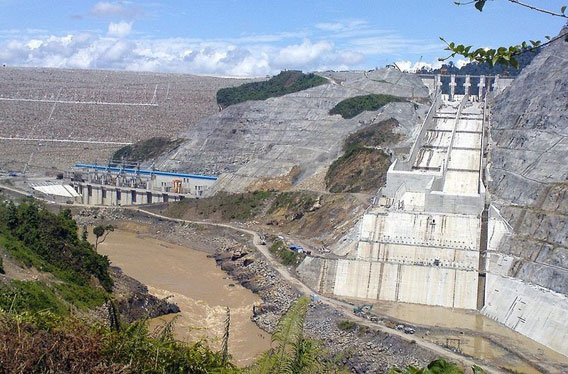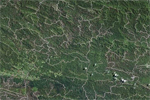
Bakun dam during construction. Photo by: Mohamad Shoox.
Indigenous people from the Malaysian state of Sarawak have sent a letter to the German company, Fichtner GmbH & Co. KG, demanding that the consulting group halt all activities related to the hugely-controversial Baram dam, reports the NGO Bruno Manser Fund. Critics of the dam and it parent project known as the Sarawak Corridor of Renewable Energy (SCORE) initiative, say the hydroelectric dam will displace 20,000 people and flood 40,000 hectares of primary rainforest.
Fichtner GmbH & Co. KG has been working as a consulting firm for Sarawak Energy, which is building the controversial dams, including Baram. Fichtner has been completing feasibility studies on the dam, however Bruno Manser Fund says local communities have not been allowed to see the studies. The slate of dam building has brought international attention to Sarawak’s indigenous people and government, including a recent petition by Avaaz specifically focused on the Baram Dam.
If built, the Baram Dam is expected to produce 1,200 megawatts. However, Sarawak recently completed the 2,400 megawatt Bakun Dam, which produces double the energy consumed by the state of Sarawak at peak times. Another dam, the 900 megawatt Murum dam, is currently under construction. It was long thought the glut of power being produced by the dams would go to a massive $2 billion aluminum smelter by Anglo-Australian mining company Rio Tinto, but the mining giant recently cancelled the project.
The recently completed Bakun Dam forced the removal of 10,00 indigenous people and flooded 70,000 hectares of rainforest.
Related articles
Mining cancellation throws wrench into Sarawak dam-building spree

(03/27/2012) The world’s third largest mining company, Rio Tinto, and a local financial and construction firm, Cahya Mata Sarawak (CMS), have cancelled plans for a $2 billion aluminum smelter to be constructed in the Malaysian state of Sarawak. The cancellation calls into question Sarawak’s plan to build a dozen massive dams—known as the Sarawak Corridor of Renewable Energy (SCORE) initiative—that were proposed, in part, to provide power to the massive aluminum smelter. However, the mega-dam proposal has been heavily criticized for its impact on Sarawak’s rivers, rainforest and indigenous people.
Activists form network to fight Sarawak dam-building spree
(02/15/2012) Last October indigenous groups, local people, and domestic NGOs formed the Save Sarawak’s Rivers Network to fight the planned construction of a dozen dams in the Malaysian state on the island of Borneo. The coalition opposes the dam-building plans, known as the Sarawak Corridor of Renewable Energy (SCORE) initiative, due to its impacts on indigenous and river communities, the destruction of pristine rainforest, and the degradation of the state’s rivers.
Malaysian court blocks rainforest tribes’ fight against mega-dam in Borneo
(09/09/2011) Indigenous tribes in Borneo suffered a stinging defeat Thursday after Sarawak’s highest court ruled against them in 12-year-long legal battle. Tribal groups had challenged the Malaysian state government for seizing indigenous lands in order to build a massive hydroelectric power plant, dubbed the Bakun dam, but the three-person top court found unanimously against the tribes.
Rainforest tribe forcibly removed from dam area to palm oil plantation
(06/23/2011) A thousand Penan indigenous people have been forcibly moved from their rainforest home to monoculture plantations, reports Survival International. To make way for the Murum dam, the Malaysian state government of Sarawak is moving a thousand Penan from their traditional homes, but as apart of the deal the government promised to move the Penan to another part of their ancestral land. The government has since sold that land to a palm oil company, which is currently clearcutting the forests for plantations.
Report: corruption in Sarawak led to widespread deforestation, violations of indigenous rights

(03/10/2011) At the end of this month it will be 30 years since Abdul Taib Mahmud came to power in the Malaysian state of Sarawak. Environmentalists are using the occasion, along with new revelations, to highlight corruption and nepotism they say have characterized his regime. Chief Minister Taib and his decades-long administration are no strangers to such allegations, but a new report from the indigenous-rights group Bruno Manser Fund (BMF)—amid criticism from independent media sources, such as Sarawak Report and Radio Free Sarawak—are adding fuel to the fire. Most recently, the report describes in great detail how the tropical timber trade in Sarawak has undercut indigenous groups while toppling some of the world’s greatest rainforests, all at the expense of the Sarawak people.